Is the Bible’s Definition of God So Difficult?
From Focus on the Kingdom, October, 2012After these decades of pondering and reading about how believers have struggled to define God in the Bible, I am left wondering: Was this really meant to be such a torturously difficult brainbreaking subject? The history of this subject is littered with contentious church councils and often a cruel dogmatism which banished or even killed those who did not submit to ecclesiastical authority.
Have theology and Christology — who is God and who is Jesus — really warranted anathemas, excommunications and even murders in the name of “right doctrine”? Yes, I know that conventional systems of belief warn you never, on pain of the loss of your salvation, to veer from “orthodoxy.”
The fear factor is very great! But the fact remains that the average churchgoer cannot defend the doctrine of the Trinity!
Here is what I propose as an easy way to approach the subject of defining God biblically. When Jews and Jesus and Paul made definitive and decisive statements about their creed, which is nothing less than a declaration of the constitution of the universe, they model a refreshing simplicity. When asked by a fellow Jew about the greatest of all the commandments, Jesus replied by citing what was really Judaism’s only “creed”: “Listen, Israel, the Lord our God is one Lord” (Deut. 6:4 cited by Jesus in Mark 12:29). That God, and no other, was to be understood and loved. All else meant an inevitable lapse into idolatry, the most awful sin — the sin to be avoided at all costs.
When Jesus replied to the inquiring scribe (professional scholar) that “the Lord our God is one Lord” (Mark 12:29) the scribe responded warmly and enthusiastically:
“You have spoken well, rabbi, that God is one and that there is no other than He.”
Will you, reader, now face this question? Is this creed of Jesus and the Jewish scholar your creed, or have you been taught a creed of a different sort? Are the words of Jesus, the Savior, your prime concern?
What about the Jewish Christian Paul, minister in Christ to the Gentiles? What was his creed? Was it complex, requiring pages of technical language for its expression? Definitely not. In 1 Corinthians 8:4-6 Paul tackles our issue by discussing the many gods and lords of the pagan world. Then by contrast he states the Christian creed: “To us [Christians] there is ONE God, the FATHER, and no other God but He.”
There are 1300 similar verses in the NT in which the Greek word theos (GOD) means the Father! Each of these is a unitarian proof text! Not once when the Bible says GOD, in either Testament, does it mean a triune, Trinitarian God! How can we conclude otherwise than that the God of the Bible and of Jesus is not a Trinity!
Does this require the help of an army of learned theologians to grasp that “To us there is one God, the Father”? Did not Paul obviously declare the same creed as uttered by Jesus and the Jewish scribe? God is one and there is no other. That one God is the Father and there is no other God but He. This is the essence of simplicity and clarity.
Now think about this: What does a Trinitarian creed sound like? The proposition is “There is one God, the Father, Son and Holy Spirit.” Such a creed is never stated in Scripture. Could that be because the Bible writers had never heard of such a creed?
Do we realize that Jesus is not once called the LORD GOD? He is called the lord Messiah in Luke 2:11, and this title for the Messiah ought to be trumpeted everywhere. Luke recorded a splendid fact of human history when he announced the birth not of GOD (God cannot be born) but of the lord Messiah (Luke 2:11).
The blind men seeking to regain sight hailed Jesus and appealed to him as “lord, son of David.” [Matthew 20:30-31] “Lord” here obviously and plainly did not mean LORD God!
Add now the simplicity of Malachi 2:10. “Do we not all have one Father? Has not one God created us?”
You probably know that one of the basic features of the Hebrew Bible (the OT) is that two statements like this reinforce each other. Two propositions repeat the same idea for clarity and emphasis. Malachi summarized the whole OT (indeed the whole Bible) in one beautifully non-complex idea. “There is One God who is the Creator and Father of the nation of Israel and of the whole universe.” Why not let your mind rest in that glorious health-giving truth?
This same God of Abraham, Isaac and Jacob was of course the God of Israel, and of the prophets, and the “God and Father of our lord Jesus Christ.” Is this difficult? That One God, the Father, had revealed Himself as a single Divine Person by means of thousands of singular personal pronouns. You know, I am sure, that a singular personal pronoun defines a single person. God is called one Person, too, when the Bible speaks
(21 times) of God’s soul, His self. He is a single, individual divine Self.
How complicated was Paul’s later and final declaration about God? Not so hard. “There is one God, and one mediator between God and man, the man Messiah Jesus” (1 Tim. 2:5). Paul could have so easily written, “There is one God, the Father, Son and Holy Spirit.” But he did not!
How frequently the Bible says that he who believes that Jesus is the Christ, or the Son of God, is pleasing to God. Never once does it say that he who believes that Jesus IS GOD is doing well. It is amazingly significant that John wrote his whole gospel with the express intention of conveying to us all that “Jesus is the Messiah, the Son of God” (John 20:31). It was in that great truth and nothing else that we are to find rest, peace and spiritual security. (But you may find a considerable hostility to that easy creed in many church circles!)
If we turn to Trinitarian attempts to describe and define a belief in one God, we have moved from biblical simplicity to frightening complexity. Dr. James White’s Forgotten Trinity contains a chapter titled “What Is the Trinity?” Dr. White rightly complains that many a discussion of the Godhead becomes mired in confusion, because terms are not defined. He then leads with this heading: “Can You Define the Undefinable?” He asks us to consider that in trying to define God “we have real difficulty right at the start: language itself. Christians have struggled for centuries to express within the limitations of human language the unique revelation that God makes of His mode of existence. We struggle because language is a finite means of communication. Finite minds are trying to express in finite language infinite truths” (p. 24).
Has it not occurred to Dr. White that God’s revelation in Scripture about how many He is given us in normal grammatical language? Otherwise it would not be a revelation at all.
I note right away that Dr. White cites some 250 Bible verses but he has not mentioned Malachi 2:10 nor the creed of Jesus in Mark 12:29, nor Paul’s summary description of God in 1 Timothy 2:5. When he gets to 1 Corinthians 8:4-6 he cites Paul’s reference to “one God, the Father.” This is a typical Jewish Christian unitarian assertion, echoed by Jesus in Mark 12:29, that God is a single Person, the Father. Yes, indeed the Lord Jesus Christ is immediately associated with the Father, but Dr. White assumes that “one Lord” for Jesus is equivalent to one God. Some, he recognizes, say that because Paul restricts the Father to the category One God this means that Jesus is not also the One God.
After all, Jesus is called the “one Lord Jesus Christ.” If, so the argument goes, Jesus is the one Lord, then the Father must be excluded from Lordship. The argument is fallacious. Dr. White’s assumption is that Lord when used of Jesus and God has the same meaning. That is not so. As early as Luke 2:11 Jesus is defined as the lord Messiah and in 2:26 he is the LORD’s [YHVH's] Messiah. Both Jesus and God are “lord” but in quite different senses.
Elizabeth knew this when she recognized Mary as “the mother of my lord” — not the mother of YHVH. All this goes back to the centrally important Psalm 110:1 where there are two lords.
The one Lord God, YHVH, utters a solemn oracle in favor of David’s lord, “my lord.”
The word in the Hebrew for the second lord is adoni, which in all of its 195 occurrences never means GOD or Deity. Adoni, my lord, is the supremely important royal title for the king of Israel and other leading personalities, but adoni, my lord, never means God. The word for God is Adonai, the supreme Lord God. The distinction in the Hebrew and the Greek is fundamental, lest we fall into the trap of believing in two Lords who are both Lord God!
The distinction between Lord God (Adonai) and a human superior, my lord, is essential to good understanding. The famous International Bible Encyclopedia stated the truth: “It is essential to distinguish carefully between the divine and non-divine title adonai and adoni.”
The whole of the NT is built on the scheme proposed by the oracle in Psalm 110:1. Jesus knew this well when he stumped his antagonistic audience by citing Psalm 110:1. He told us that it was the Son of man at the right hand of God (Mark 14:62), and Stephen at his death saw Psalm 110:1 in action and defined the second lord as the Son of man (Acts 7:56). That demonstrates that adoni (my lord) is a human being. Psalm 80:17 had also defined the Messiah as the “man of Your right hand.”
No one ought to imagine that the second lord was God! The whole picture of God and man was distorted when Jesus was defined as a second God in a triune Godhead. This unfortunate theological development from the second century removed the creed of Jesus (Mark 12:29) from the foundation of the faith. It led to endless squabbles and centuries of unnecessary argument, dividing and confusing.
The end product was an imperial-ecclesiastical decision to anathematize anyone who dared say the Son of God began to exist in history! Matthew’s and Luke’s accounts of the coming into existence of the Son of God were ruled out of bounds. They are in fact simple statements about the origin of the Son in Mary, by miracle (Luke 1:35; Matt. 1:18, 20).
Equally confusing was the loss of the Hebrew Bible’s long preparation and fore-announcing of the Messiah (Christ) to come. David had already referred to the Israelite King Saul as the Lord’s [YHVH's] anointed. The Hebrew reads “the Lord’s [YHVH's] Messiah” (1 Sam. 24:6). The people were looking forward to the ultimate righteous human king, not a visitor from a complex Triune Godhead. Israel knew nothing of such a God, and still does not.
It is really amazing to imagine Jesus believing in a Trinitarian God! If he did, how could he possibly have kept a straight face while agreeing with a learned Jew about the “Hear, O Israel”? About the One True God?
Christians should be encouraged to engage a gentle conversation with all-comers on this point:
Is Christianity the only world religion which begins by discarding its own founder’s creed?
I ask this seriously; it is a really interesting question.
Jesus in multiple passages makes obedience to his teachings the absolute key (John 12:44ff; 3:36; Heb. 5:9, etc.) and criterion for a successful relationship with him and his Father. Is anyone going to argue that Jesus in Mark 12:29 was proposing a Triune God?
Luke knew well that the promised Savior was to be born, and he brilliantly introduces us to the ultimate Christ, Messiah, the Anointed One. Using the same language as the 16 references to the OT “anointed one,” Luke presents Jesus to us as “the Lord’s [YHVH's] Anointed,” i.e. Christ, “the Lord’s [YHVH's] Christ” (Luke 2:26). Here then is the final David, the final perfect king in the line of earlier flawed kings. Yes, Jesus was the sinless king, as well as the King Messiah of ancient expectation.
When he arrived, supernaturally begotten in Mary (Matt. 1:20; Luke 1:35; 1 John 5:18, not KJV), his people were so drugged by the religious establishment of the day that they were unable to recognize him! They killed him as a false Messiah. They thought he ought to have freed them from Rome and inaugurated the promised worldwide Messianic Kingdom there and then. Jesus instructed his inner circle, those who recognized him as indeed the long-promised King Messiah of Israel, that after a period undetermined (left in the counsels of God, Acts 1:7) he would reappear, this time from heaven, to commence his royal rule in Jerusalem. And to involve his true followers of all the ages to assist him in managing the world (Matt. 19:28; Rev. 2:26; 3:21; 5:10: “on the earth”; 1 Cor. 6:2, Dan. 7:18, 22, 27).
It was not long before even some of his followers, beginning late in the first century, abandoned this hope and substituted a vague promise of heaven for individuals at death! Added to this, they transformed the man Messiah Jesus of Paul’s easy creed in 1 Timothy 2:5
(exactly echoing Ps. 110:1!) into a second God. Of course they loudly proclaimed that they believed in one God! But they conveniently left out the NT definition of that One God. The NT, echoing thousands of OT verses, and based on the unitarian creed of Moses and Jesus (Deut. 6:4; Mk. 12:29), was that “there is one God, the Father.” You will look in vain for any reference to “one God, the Father, Son and Holy Spirit”! That is not the belief of the early Christians. There are 1300 verses in the NT which make the same unitarian proposition. That is, the word GOD means the Father 1300 times. Each of these statements, ranging across the whole NT, signals the easy fact that God is one Person.
Psalm 110:1, with its unique oracle from YHVH, penned as Jesus said under inspiration and given to David, places a human Messiah, Son of God and of David, “at My right hand until I make your enemies your footstool.” Astonishingly today you can walk into the average Christian bookstore, pick up one of several commentaries on the Psalms, and find that the second lord in Psalm 110:1 is Adonai, the Lord God! How is the protest against this unwarranted piece of misinformation going to begin? It is time for the public to be warned that its traditions are not solidly biblical. A mindless, uncritical approach seems to lull churchgoers into a cheerful acceptance of the status quo! But all is not well when Scripture is being misrepresented at its heart.
Psalm 110:1 has yet to have its day! The LORD gave an utterance to “my lord” (adoni). Adoni is the standard royal protocol address to the king and other superiors. No one calls GOD adoni in the Bible. The Lord God is Adonai and the distinction has been long understood — but not to the Bible-reading public.
The 6,828 occurrences of YHVH never appear as kurios mou (my lord) in the LXX, the Greek version of the NT which is very frequently cited by the NT.
In desperation to maintain the notion that God speaks to God in Psalm 110:1, some have tried to argue that the vowel points in the Hebrew text of today have been corrupted. Happily the NT provides inspired evidence for this very false allegation. Adoni (my lord) in Hebrew is properly rendered as kurios mou (my lord) in Greek. Scores of verses show the standard contrast between a human leader (adoni, my lord) and Adonai or YHVH = the Lord God.
It is a grand fallacy to think that in the times before the vowel points were added to the written text, no one read the text aloud! It was read week by week in the synagogue and the difference between YHVH (Lord God) and adoni (my [human] lord) was well understood, and it is reflected in the Greek OT Bible (the LXX) in BC times. That difference is confirmed by the NT when it translates adoni (my lord) into the Greek words kurios (lord) mou (my). Scores of times this distinction is found in the LXX, the Greek Bible quoted often and thus affirmed as true by the NT writers.
In complete desperation some have ventured to challenge the word adoni appearing in the standard Hebrew text, faithfully transmitted over the centuries. Some have found three exceptions to the rule that Adonai is kurios (the Lord) and not kurios mou (my lord)! What they did not notice is that the 3 exceptions (exceptions do not make the rule!) occur when GOD, one Person (unlike Ps. 110:1 where God speaks to another), is given a double address as Lord and God. In these unusual and exceptional cases the Greek adds a mou (my) to Lord to address God. The two main examples are found in Psalm 16:2 and 35:23. You will see at a glance that neither is in any way parallel to Psalm 110:1 and the scores of examples like it. One must not compare apples with oranges.
In the scores of verses in which kurios (Lord God, Yahweh) is contrasted with a non-Deity superior, that non-Deity superior is called adoni, kurios mou, my lord. The system of distinction is secure and obvious. Two exceptions in which God is called “my Lord” are readily explicable because of a single addressee.
Your Bible is not corrupted in its original Hebrew in Psalm 110:1 (except for the translators’ false capital on the second lord.
[That is, a capital L was added when translated into English]).
The Hebrew word is entirely secure. It is adoni, a word which needs to come out of hiding worldwide and shine as the beacon light defining the human Messiah Jesus. Paul said it all well in 1 Timothy 2:5: “There is one God [obviously the Father here, as in 1300 other NT verses!] and one mediator between God and man, the man Messiah Jesus.” God has planned to judge the world by a MAN whom he has appointed. He raised that man from the dead, and God cannot raise God from death since God cannot die! (For all this read Acts 17:30-31.)
The above article was taken from here.
 Him for a thousand years.
Him for a thousand years.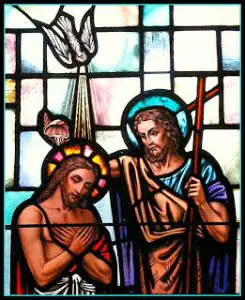 God. Professor of religion and philosophy
God. Professor of religion and philosophy
 John 7:40-44
John 7:40-44 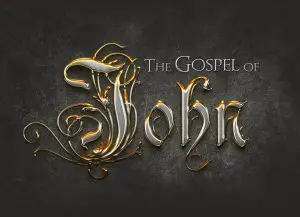 John 20:30-31
John 20:30-31 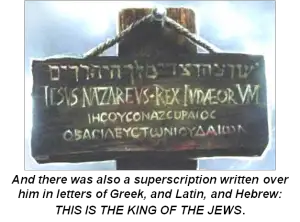 Luke 23:1-3
Luke 23:1-3 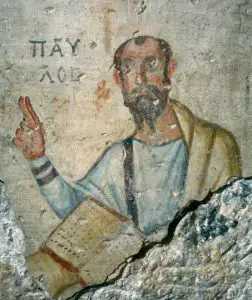
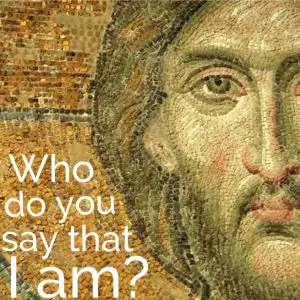 Who is this man from Nazareth? God incarnate? The second member of a triune deity? Or the Christ, sent by God? It depends on whether you answer according to fourth century orthodoxy or Scripture. The post-Biblical tradition says that we must believe Jesus is God in order to be saved. But according to Scripture, we are born again if we believe that Jesus is the Christ:
Who is this man from Nazareth? God incarnate? The second member of a triune deity? Or the Christ, sent by God? It depends on whether you answer according to fourth century orthodoxy or Scripture. The post-Biblical tradition says that we must believe Jesus is God in order to be saved. But according to Scripture, we are born again if we believe that Jesus is the Christ: 
